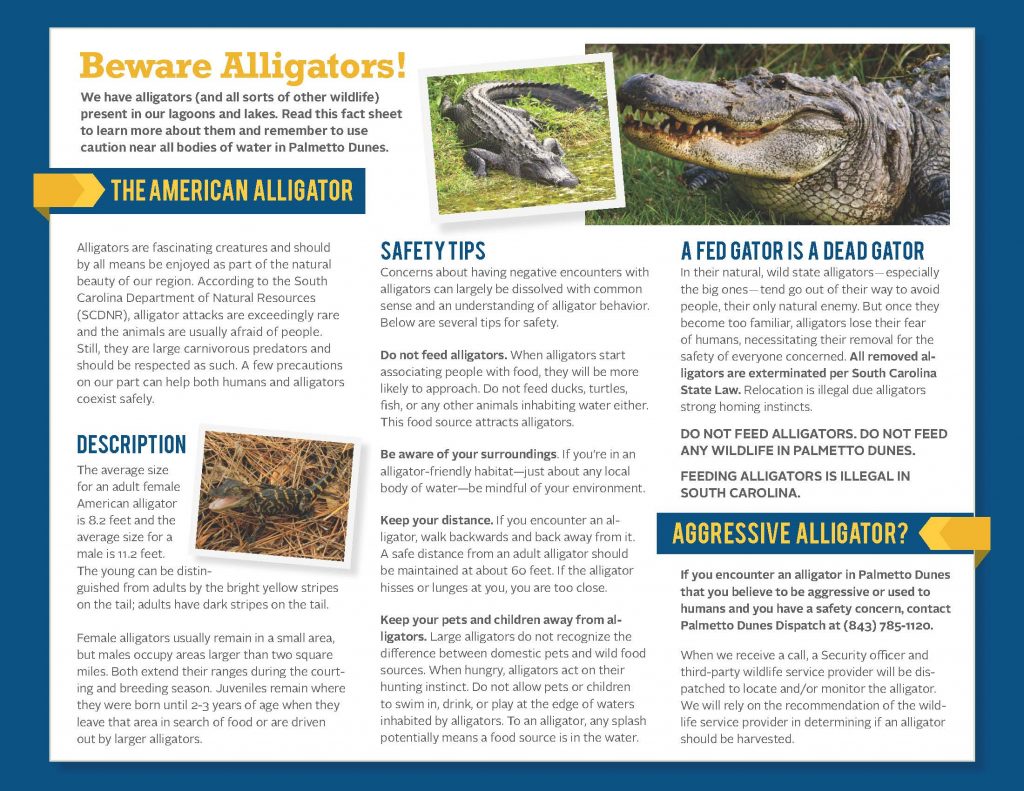Alligator Safety
Last week a Hilton Head Island woman was bitten by an eight-foot alligator when walking her dog around a lagoon in Hilton Head Plantation.
According to Fire Rescue personnel, a witness heard a commotion near the lagoon located near her home. She investigated and found the victim in the water with an alligator latched on to her lower leg(s). The witness entered the water and tried to pull the victim back to safety. The witness’s husband joined the rescue efforts and together they were able to free the woman and call 911. Following treatment at the scene, the woman was transported to Memorial Health in Savannah. The dog was not harmed.
S.C. Department of Natural Resources (DNR) arranged for removal and euthanization of the alligator, and plan to examine its contents to determine if had been fed. When fed, alligators overcome their natural wariness and can begin to associate people with food. Click here to read the Town of Hilton Head’s news release.
While this incident did not happen in Palmetto Dunes, we do want to take this opportunity to remind owners and guests to always use caution around our lakes and lagoons and to remain vigilant of their surroundings.
We encourage all short-term rental property owners to download our Alligator Fact sheet to share with your guests. Click here to download. Copies are also available for pick-up in our Admin and Pass offices.
What should I do if I encounter an alligator I believe to be aggressive or habituated to humans?
Alligators are regularly observed in and around bodies of water in Palmetto Dunes. If you encounter an alligator that is aggressive or have a safety concern, please call Dispatch at 843-785-1120.
How does the association handle reports of aggressive or habituated alligators?
SCDNR establishes procedures for managing alligators, and permits removal of alligators who exhibit aggressiveness, habituated behavior towards humans, illness/injury, or inhabit a recreational swimming area. When we receive a call, a Security officer is dispatched in an attempt to locate the alligator. Additionally, a third-party wildlife service provider is contacted to locate and/or monitor the alligator. Our Security Department will rely on the recommendation of the wildlife service provider in determining if an alligator should be harvested.
What happens to an alligator once removed?
Once they become too familiar with people, alligators lose their fear of humans, necessitating their removal for the safety of everyone concerned. All removed alligators are exterminated per South Carolina State Law. Relocation is illegal due to the creatures’ strong homing instinct.
Alligator Safety
Concerns about having negative encounters with alligators can largely be dissolved with common sense and an understanding of alligator behavior. Below are several tips for safety. We encourage you to share these with your visiting family members, friends, and guests.
- Do not feed alligators. When alligators start associating people with food, they will be more likely to approach you. Do not feed ducks, turtles, fish, or any other animals inhabiting water either. This food source attracts alligators and similarly trains them to associate humans with food.
- Be aware of your surroundings. If you’re in an alligator-friendly habitat—just about any body of water in the Lowcountry—be mindful of your environment.
- Keep your distance. If you encounter an alligator, walk backward and back away from it. A safe distance from an adult alligator should be maintained at about 60 feet. If the alligator hisses or lunges at you, you are too close.
- Keep your pets and children away from alligators. Large alligators do not recognize the difference between domestic pets and wild food sources. When they are hungry, alligators act on their hunting instinct. Do not allow pets or children to swim in, drink, or play at the edge of waters inhabited by alligators. To an alligator, any splash potentially means a food source is in the water.
